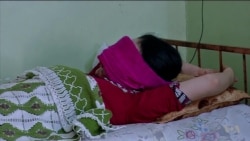A Yazidi woman, disfigured by a mine blast while escaping enslavement by Islamic State, received the European Parliament’s Sakharov Prize for freedom of thought and expression on Thursday.
After a VOA article in May detailed her plight and a lack of medical help, an aid group stepped in and resettled her in Germany where she has since received several surgical procedures to repair her face. This is an edited version of two stories that first appeared in May.
"VOA was the first website to help get her story reach to the world. The coverage was in a time when Lamiya needed to go out of [Iraq] to get needed surgery. We truly thank VOA for that," Mizra Dinnayi, head of the German-based Air Bridge Iraq, said.
When Lamiya Hachi Bashar escaped the house of an Islamic State fighter in Iraq in mid-April, she thought months of enslavement and IS terror were finally over.
But on her way to freedom outside the Iraqi town of Hawija, Bashar, 18, lost her sight in a blast from a land mine explosion. Her face was severely disfigured.
“Her right eye is pretty much gone, but her left eye can recover,” said Kurdish doctor Husain Bahrari, who treated her. “She also suffers from extensive facial laceration.”
Bashar, one of thousands of Yazidis who have suffered under systematic violence by IS, is facing a bleak future. Her doctor told VOA that her complex injuries require treatment that is not available in Iraq.
“There needs to be a plastic surgery quickly to avoid scars that are unrecoverable,” Bahrari said. “A young girl her age needs that.”
When IS attacked Bashar’s village of Kojo in August 2014, she and 12 members of her family were taken prisoner.
Around 5,000 Yazidi men and women were captured by the militants that summer. Some 2,000 of them managed to escape or were smuggled out of IS’s self-proclaimed caliphate in Iraq and Syria, activists say.
“I was kept in a prison with my family for one month before they took me and my two sisters along with hundreds of the girls to [IS capital] Raqqa,” Bashar told VOA.
While in IS captivity, Bashar said she was sold five times as a sex slave and faced mental and physical abuse. One IS leader in Mosul forced her into making suicide belts and preparing car bombs.
“IS fighters were coming many times to take them,” she said. “He [one IS militant] asked me to marry him. ... I told him, ‘I won’t do this and I won’t help you.’ He hit me with hoses and floor squeegee handles. There was nothing left he didn’t use to beat me.”
Bashar was later sold to an IS doctor in the Iraqi town of Hawija, where she met two other Yazidi girls, Almas, 8, and Katherine, 20. They were able to secretly contact their relatives, who arranged with a middleman to facilitate their escape.
In mid-April, the girls started their dangerous journey to escape IS slavery to Iraqi Kurdistan. An Arab family also accompanied the girls, Bashar said.
Their facilitator took the group out of the city in a car, Bashar said. Their guide told them to avoid land mines that IS placed to stop people from fleeing.
“Katherine stepped on a mine, and all I saw after that was a bright light in front of my eyes,” Bashar said. “I called Katherine and Almas but all I heard was an ‘ah’ from Katherine.”
The girls died at the scene, their bodies left in a field. Bashar, who was injured, does not remember how she was rescued. Family members say her guide took her to the Kurdish Peshmerga.
Despite her trauma, Bashar remains optimistic and grateful.
“I would rather stay here blind than being with them [IS] sighted,” she told VOA.
Following the VOA report, several organizations and individuals reached out to help. Bashar remains in Germany where she has been resettled and is getting continued medical care.
The VOA report "helped her story to be heard everywhere," Bashar's uncle, Idris Kojo, said in May.





